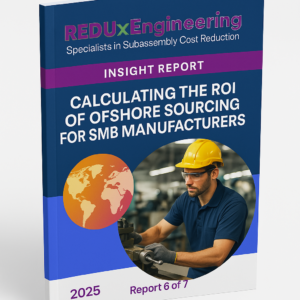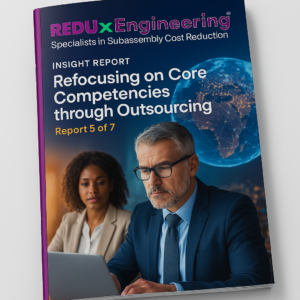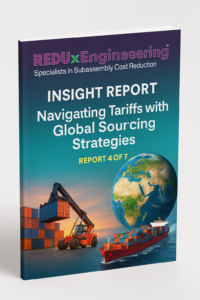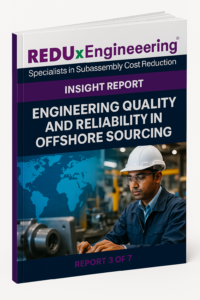
In today’s hypercompetitive global market, many North American manufacturers still cling to the notion that everything “made in America” is synonymous with quality and patriotism. Yet, if you’re a CEO, COO, VP of Operations, or Supply Chain VP running a $20M–$250M company, it’s time to face a hard truth: the relentless pursuit of vertical integration in non-core areas can be a self-imposed straitjacket. When it comes to non-core parts and subassemblies, asking the “build vs. buy” question isn’t just a cost-saving tactic—it’s the difference between thriving in an era of dynamic global tariffs and watching competitors gobble up market share.
Thank you for reading this post, don’t forget to subscribe!In this article, we peel back the layers of manufacturing tradition, toss a little sarcasm at outdated mindsets, and show you how embracing strategic managed offshoring can revolutionize your bottom line. We’ll delve into the economics, the real-world case studies, and the strategic imperatives that prove offshoring to specialized, advanced, high-volume, industry 4.0 manufacturers is the future—and the only viable path for local growth.
The Build vs. Buy Conundrum: An Economic Imperative
For decades, the prevailing wisdom among American manufacturers has been: “If it isn’t built in-house, it can’t be built right.” This dogma, often steeped in tradition and emotional attachment, ignores a harsh economic reality. As Harvard Business Review and The Economist have repeatedly underscored, companies that specialize tend to do it better—and at a fraction of the cost.
Imagine spending millions to build every component yourself, from low-pressure injection molded parts to intricate printed circuit board assemblies, rather than leveraging the efficiencies that come from economies of scale. This isn’t just about cutting costs; it’s about focusing on what you do best. A manufacturer that clings to the myth of “we can do it all” is often sacrificing valuable resources that could instead be channeled into innovation, quality improvement, and market expansion.
The real kicker? The notion that no one else can build these parts better than you is as quaint as believing in unicorns. In the modern supply chain, the art of specialization reigns supreme. Offshoring non-core parts to partners who have honed their craft over decades—operating at volumes and efficiencies that you simply can’t replicate—provides a critical competitive edge.
Emotional Attachments & The Myth of Vertical Integration
Let’s be honest: many manufacturers view vertical integration as a badge of honor. “We’re American. We build everything ourselves.” But in a globalized world, this self-congratulatory stance is dangerously myopic. It’s like insisting on changing your oil at home when you could simply visit Jiffy Lube—only with far more significant cost and quality implications.
When manufacturers become emotionally attached to the idea of producing every part in-house, they risk falling into the trap of rigidity. This inflexibility not only stifles innovation but also leads to inefficient use of capital. As IndustryWeek and other respected publications have noted, the drive for vertical integration often results in bloated operations and missed opportunities to invest in the areas that truly matter.
Consider this: by diverting resources to build non-core components, you’re effectively tying up cash that could be reinvested in your core competencies. Instead of dedicating funds to R&D, marketing, and employee retention, you’re funding expensive, specialized processes that do not contribute directly to your competitive advantage.
Case Studies: Real-World Savings and Superior Performance
Theory aside, nothing speaks louder than hard data and real-world examples. Let’s break down a few case studies that illustrate the transformative impact of strategic offshoring when executed with the right partner—REDUxEngineering.
STRUCTURAL REACTIVE INJECTION Molded Part Project
- Annual Volume: 7,500 pcs.
- Original Material: CNC machining combined with assembly.
- Original Cost: $574 each.
- Project Time: 6 months.
- New Material: Mixed composite.
- Mold Cost: $85,000 (one time).
- New Cost: $287 each.
- Saving: $287 each.
- Annual Saving: $2,152,000.
A case study that sounds like a fantasy for many: by switching to a mixed composite material and partnering with an advanced offshoring facility, the manufacturer not only halved the production cost but also unlocked annual savings in the multi-million-dollar range. This example is a clarion call: if you’re still on the fence about offshoring, consider the dramatic cost implications of staying the course.
Printed Circuit Board Assembly Project
- Annual Volume: 80,000 pcs.
- Original Cost: $85 each.
- Project Time: 4 months.
- New Cost: $65 each.
- Saving: $20 each.
- Annual Saving: $1,600,000.
Quality and cost go hand in hand in modern manufacturing. In this project, specialized offshoring not only reduced the unit cost significantly but also ensured that every printed circuit board met rigorous quality standards—a testament to the advantage of working with partners who live and breathe industry 4.0 processes.
Power Cable Project
- Annual Volume: 10,000 pcs.
- Technical Requirement: 1000VDC/750A continuous current, operable in salty water, with a temperature range of -40°C to +65°C and capable of withstanding 50G shockwave.
- Original Cost: $300 each.
- Project Time: 6 months.
- New Cost: $100 each.
- Saving: $200 each.
- Annual Saving: $2,000,000.
In the power cable project, the technical requirements were formidable. However, the specialized manufacturer’s expertise meant that these cables were produced to exceed stringent specifications, all while dramatically reducing the cost. This isn’t merely a price reduction; it’s an affirmation that quality and cost efficiency are not mutually exclusive when you engage the right offshoring partner.
Metal Enclosure Project
- Annual Volume: 500 pcs.
- Technical Requirement: ANSI/IEEE C37.20.7, Arc-Resistance.
- Original Cost: $2,800 each.
- Project Time: 7 months.
- New Cost: $1,500 each.
- Saving: $1,300 each.
- Annual Saving: $650,000.
The metal enclosure project underscores the importance of technical compliance and quality assurance. By switching to a specialized offshore provider, the manufacturer achieved high-quality output at nearly half the cost, reinforcing the strategic value of offshoring non-core components.
Quality & Pricing Advantages: The Offshore Edge
You might ask: “Why not buy locally from higher-cost, less specialized regional contract manufacturers (CMs)?” The answer is deceptively simple. Offshore manufacturers operating in non-tariff, low-cost regions are not only cost leaders—they are also masters of quality control and efficiency.
The Specialized, High-Volume Advantage
Offshore manufacturing hubs such as those in Vietnam, Thailand, Malaysia, Indonesia, Eastern Europe, Mexico, and China are home to a network of advanced, industry 4.0 facilities. These plants have invested heavily in automation, robotics, and state-of-the-art quality control systems that far exceed the capabilities of many regional CMs. The result is a twin benefit of superior quality and unmatched cost efficiency.
The savings come not only from lower labor costs but also from streamlined processes and scale economies that are impossible to replicate in high-cost regions. This is a point often made in the pages of respected industry journals like IndustryWeek and Manufacturing.net—specialization matters. When you’re buying from a manufacturer that produces thousands, if not millions, of parts per year, quality becomes a by-product of the process, not an afterthought.
Pricing Advantages That Local Manufacturers Can’t Ignore
The pricing advantages of offshore production are as clear as day: lower unit costs, reduced overhead, and rapid scalability. Consider the significant cost reductions seen in our case studies—from a 50% reduction in costs for certain parts to annual savings that reach into the millions. These numbers aren’t mere academic exercises; they translate directly into competitive pricing on your final assembled product, enabling you to win larger market shares both domestically and globally.
Moreover, the lower costs achieved offshore provide manufacturers with the liquidity to reinvest in areas that drive growth. The savings can be allocated toward enhancing R&D, boosting marketing efforts, expanding the business development team, and improving employee benefits and retention. This reinvestment is crucial for staying competitive in a global market where innovation and adaptability are the keys to survival.
Strategic Offshoring: The Win-Win for Local Growth
Imagine a scenario where your manufacturing process is lean, agile, and laser-focused on your core competencies. Instead of spreading your resources thin by trying to build everything in-house, you outsource non-core components to trusted partners who excel in that domain. The resulting benefits are multifaceted:
- Improved Focus on the Core Offering:
By offloading non-core parts to specialized manufacturers, you free up your internal resources. This means you can invest more in what truly differentiates your company—whether it’s proprietary technology, innovative design, or superior customer service. - More Competitive Pricing:
The cost savings from offshoring translate directly into lower prices for your final product. This pricing advantage is critical in winning bids and expanding your market reach. In a global economy where even small cost differences can determine the winner, being able to offer competitive pricing is a game-changer. - Increased Cash Flow for Strategic Investments:
Savings are not just about reducing costs; they create cash flow that can be reinvested strategically. With additional funds, you can accelerate R&D efforts, launch robust marketing campaigns, and bolster your business development team. This reinvestment fosters innovation and positions your company as a forward-thinking leader in the industry. - Enhanced Employee Benefits and Retention:
Financial health isn’t just measured in production costs—it’s also reflected in the ability to attract and retain top talent. By achieving cost efficiencies through offshoring, you can allocate more resources toward competitive employee benefits, training programs, and recruitment initiatives. - Agility in a Changing Tariff Landscape:
Perhaps one of the most compelling arguments for offshoring is the ability to pivot in response to shifting global tariff policies. With a mature network of pre-vetted contract manufacturers spread across multiple countries, you have the flexibility to shift production to tariff-free regions quickly. This agility protects your margins and gives you a strategic advantage over competitors who remain locked into on-shoring.
The benefits of strategic offshoring are clear: it’s a win-win scenario that allows local manufacturers to thrive by focusing on their strengths while leveraging the expertise and cost advantages of specialized offshore partners.
REDUxEngineering: Your Strategic Partner in Global Manufacturing
Let’s get straight to the point: the benefits of offshoring can be monumental—but only if executed flawlessly. This is where REDUxEngineering enters the picture. With a deep understanding of both the manufacturing process and global supply chain dynamics, REDUxEngineering offers a fully managed service that takes the hassle out of offshoring.
Long-Term Relationships: The Secret Sauce
It’s one thing to identify a low-cost manufacturer overseas; it’s entirely another to cultivate a long-term, trust-based relationship with them. We’ve all heard the horror stories—a “perfect” first article that turns into a container load of one-off spec parts, costing more in rework than any savings achieved. If you haven’t been operating in Asia for a decade or more, how can you possibly know who to trust among the thousands of manufacturers clamoring for your business?
REDUxEngineering is not a fly-by-night operator. The team has built 10 to 20-year relationships with a roster of pre-vetted manufacturing partners across key low-cost regions. They know what every delivered article will look like, not just the first sample. Moreover, by bringing a steady flow of clients into the region, REDUxEngineering ensures that their manufacturing partners are always on their A-game. This level of reliability and consistency is simply unachievable if you try to do it on your own—with countless flights, endless travel, and the inevitable miscommunications that plague international business.
Boots on the Ground: Quality Audits You Can Trust
When it comes to offshoring, one of the greatest risks is quality control. Discovering deficiencies once the container is already en route to your warehouse is a nightmare scenario. You need to be sure that every product meets your specifications before it leaves the factory floor. Dedicated in-country technical audit staff can make this happen, but for most small to medium-sized enterprises, the expense of maintaining such a team internally would negate the benefits of offshoring.
REDUxEngineering solves this problem with its on-site Quality Auditors. These experts monitor production in real time, ensuring that your key performance indicators (KPIs) and tolerances are met. This contingency-based managed offshoring savings program effectively minimizes risk while maximizing the cost and quality benefits that offshoring offers.
Navigating Tariff Turbulence with Agility
Global tariffs are unpredictable—and they can shift overnight, leaving manufacturers scrambling to adjust. For instance, if you onshore your production in the U.S. and then face retaliatory tariffs when the EU imposes restrictions on American goods, your entire cost structure could be upended. On the other hand, a manufacturer working with REDUxEngineering can pivot almost effortlessly. With a mature network of pre-vetted, world-class contract manufacturers in multiple low-cost countries (Vietnam, Thailand, Malaysia, Indonesia, Eastern Europe, Mexico, China, and beyond), your production can be shifted rapidly to tariff-free regions.
This agility is not just a defensive measure—it’s an opportunity. While competitors labor under the burden of an uncompetitive cost structure, you can remain tariff-free in both domestic and international markets. This strategic flexibility allows you to turn what might be seen as a crisis into a competitive advantage.
Beyond the Numbers: The Strategic Imperative of Offshoring
At its core, strategic offshoring is about aligning your manufacturing processes with the realities of a globalized economy. It’s the difference between clinging to outdated notions of self-reliance and embracing a dynamic, flexible approach that propels your business forward.
Consider the analogy: having your oil changed at Jiffy Lube rather than doing it yourself. It’s not just about saving time—it’s about accessing specialized, high-quality service that you simply can’t replicate in your garage. The days when every manufacturer prided themselves on being a “one-stop shop” for all components are long gone. In today’s environment, success hinges on knowing where to focus your efforts—and outsourcing the rest to those who excel at it.
The data-backed case studies we’ve explored are more than just isolated examples; they are a testament to the transformative power of strategic offshoring. By partnering with REDUxEngineering, manufacturers can leverage the twin benefits of reduced costs and improved quality. This not only enhances the competitiveness of their final products but also frees up critical internal resources that can be redirected toward growth-oriented initiatives.
The Local Impact: Reinforcing North American Manufacturing Strength
It might seem counterintuitive to rely on offshore production when the narrative in North America is dominated by “Made in America” sentiments. However, the reality is that the local benefits of strategic offshoring are profound. The cost savings and quality improvements achieved through a managed offshoring program directly translate into enhanced competitiveness in domestic markets.
Here’s how:
- Enhanced Product Competitiveness: Lower production costs allow for more competitive pricing on the final assembled product. This not only improves your win-rate in competitive bids but also enables you to expand your market reach both locally and internationally.
- Reinvestment in Core Areas: Savings realized from offshoring free up cash for reinvestment in R&D, marketing, and business development—areas that drive innovation and long-term growth. Rather than diluting resources across non-core operations, you can now concentrate on what makes your business unique.
- Strengthening the Local Economy: When manufacturers thrive, the local economy benefits. Improved margins allow companies to offer better employee benefits, invest in additional headcount, and contribute more robustly to the community. This, in turn, bolsters the overall strength and resilience of North American manufacturing.
- Global Competitiveness: By focusing on core competencies and relying on specialized offshore partners for non-core functions, North American manufacturers can more effectively compete on the global stage. When global markets are won by those who combine local innovation with international efficiency, everyone wins.
In short, embracing a managed offshoring strategy through REDUxEngineering isn’t about abandoning your local roots—it’s about reinforcing them. By optimizing the supply chain, manufacturers can maintain a strong local presence while accessing the best global resources available.
The REDUxEngineering Difference: A Strategic Game-Changer
At this point, the argument is clear: the benefits of strategic offshoring are overwhelming. But what truly sets REDUxEngineering apart is its ability to manage the complexities of the global supply chain, allowing you to reap these benefits without the headache of international logistics and quality control challenges.
Two Key Pillars for Success
- Long-Term Relationships:
REDUxEngineering isn’t just a middleman; it’s a trusted partner with decades of experience in the international manufacturing arena. Their long-term relationships with pre-vetted partners mean you know exactly what to expect—every container, every shipment, every first article. In an industry filled with horror stories about inconsistent quality and unforeseen rework costs, having a partner who truly understands the market is invaluable. - Boots on the Ground:
The value of on-site quality audits cannot be overstated. Imagine the cost and disruption of receiving a shipment that fails to meet specifications—a scenario all too common when manufacturers try to manage international production on their own. REDUxEngineering’s team of in-country quality auditors provides the reassurance that your production is continuously monitored and held to the highest standards, ensuring that your specifications are met long before your products ever leave the factory floor.
Embracing Change: From On-Shoring to Strategic Offshoring
For many, the idea of offshoring non-core parts might feel like a departure from tradition. However, as global tariffs and trade policies continue to fluctuate, the rigidity of on-shoring becomes an ever-more significant liability. When domestic policies suddenly shift, manufacturers who are locked into a single, local production base find themselves at a severe disadvantage. In contrast, those who partner with REDUxEngineering are positioned to pivot quickly, moving production to tariff-free regions without missing a beat.
This dynamic flexibility is what sets the winners apart in today’s manufacturing landscape. Instead of being paralyzed by regulatory changes or economic uncertainty, you can view tariff disruptions as opportunities to further optimize your supply chain—ensuring that your cost structure remains competitive, no matter what global forces come into play.
Conclusion:
The message is unambiguous: clinging to outdated vertical integration strategies in non-core areas is no longer good business. In a rapidly evolving global economy, manufacturers who refuse to embrace strategic offshoring are not only leaving money on the table—they are actively endangering their competitive edge.
By partnering with REDUxEngineering, you gain access to a fully managed offshoring program that leverages:
- Decades of trusted, long-term relationships with pre-vetted manufacturers.
- On-site quality audits that ensure every product meets your rigorous standards.
- The agility to shift production seamlessly in response to changing tariff landscapes.
- Dramatic cost savings that translate into enhanced competitiveness and reinvestment in core areas.
The savings from projects like the low-pressure injection molded parts, structural reactive injection molded parts, printed circuit board assemblies, power cables, and metal enclosures are not mere theoretical numbers—they are real, tangible benefits that can propel your business forward. These savings free up critical capital, enabling you to focus on what truly matters: innovation, quality, and growth.
For those who still believe that “we can do it all in-house,” it’s time for a reality check. In today’s globalized economy, it’s not only impractical—it’s downright dangerous—to remain rigid. Embrace the reality that strategic offshoring is the only viable path to sustained success. After all, much like having your oil changed at Jiffy Lube instead of doing it yourself, outsourcing non-core functions isn’t a concession—it’s a strategic advantage.
Don’t let the emotional lure of “Made in America” cloud your judgment. Instead, recognize that partnering with REDUxEngineering is not a betrayal of your local roots; it’s a smart, forward-thinking strategy that ensures your business remains competitive on a global scale. Tariffs, market fluctuations, and rising production costs are not obstacles—they are opportunities to excel. While your competitors may be bogged down by inefficiencies and rigid practices, you can enjoy the benefits of streamlined operations, reinvestment in your core strengths, and a robust supply chain that is as flexible as it is efficient.
It’s time to stop throwing the baby out with the bath water. Instead, harness the power of strategic offshoring to enhance your local growth and secure your company’s future. Let REDUxEngineering be your guide in navigating this complex landscape. The time for introspection is over—the era of strategically managed offshoring is here. If you’re ready to transform your manufacturing operations, lower your costs, and boost your competitiveness, contact REDUxEngineering for an introductory meeting and a comprehensive savings assessment. Your business—and your bottom line—will thank you.
#Manufacturing #GlobalSupplyChain #Offshoring #Industry40 #CostSavings #QualityControl #BuildVsBuy #SupplyChainManagement #ManufacturingEfficiency #OffshoreManufacturing #LeanManufacturing #OperationalExcellence #ContractManufacturing #GlobalTrade #TariffStrategy #BusinessGrowth #IndustrialInnovation #ManufacturingStrategy #CostReduction #Productivity #EngineeringExcellence #BusinessDevelopment #MarketCompetitiveness #ManufacturingInnovation #LocalGrowth #AdvancedManufacturing #SupplyChainAgility #REDUxEngineering #GlobalManufacturing #CompetitiveAdvantage






